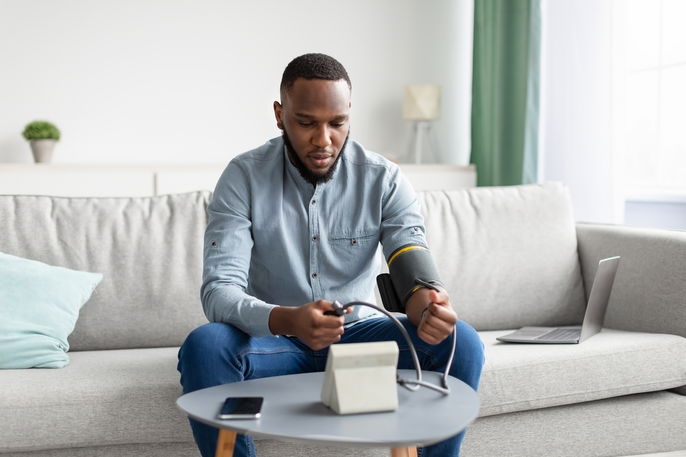Low blood pressure is characterized by a blood pressure reading that is equal to or lower than 90/60 mmHg. It can cause symptoms such as dizziness, a feeling of a heavy head, and, in more severe cases, drowsiness and confusion.
Normally, low blood pressure, or hypotension, can appear with hot weather or from getting up quickly from a lying position. It can also occur with infections, dehydration or the need to adjust medications.
When low blood pressure does not cause symptoms, it is not considered to be a problem. However, if there are associated symptoms, it is important to consult a cardiologist or general practitioner so that the cause can be identified and the most appropriate treatment can be initiated.

Common symptoms
The most common symptoms of low blood pressure are:
- Dizziness;
- Feeling of fainting;
- Difficulty concentrating or mental confusion;
- Nausea or vomiting;
- Weakness;
- Pallor;
- Sleep;
- Blurred or blurred vision.
Depending on the cause of low blood pressure, the person may also experience chest pain, shortness of breath, irregular heartbeat, high fever, headache and pain in the upper back.
Many people will feel several symptoms at the same time. Symptoms that are frequent or do not resolve on their own should be assessed by a family doctor or cardiologist. Read more about low blood pressure symptoms and how they can present.
Low blood pressure during pregnancy
Low blood pressure during pregnancy is a common finding, especially at the beginning of pregnancy. It is caused by common hormonal changes at this stage, which cause the blood vessels to dilate and blood pressure to drop.
Symptoms of low blood pressure in pregnancy are weakness, blurred, double or darkened vision, feeling faint and dizzy. Learn more about low blood pressure during pregnancy and how it can be treated.
Anxiety and low blood pressure
Anxiety, as well as other emotions, like shock, stress or fear can cause an exagerrated nervous system response, leading to low blood pressure and a drop in heart rate.
Possible causes
Blood pressure is influenced by 3 general factors: the heart's pumping capability, blood vessels and the blood itself.
Also recommended: What Causes Low Blood Pressure? 8 Possible Reasons tuasaude.com/en/what-causes-low-blood-pressureLow blood pressure caused by heart pumping problems can be a side-effect of medications, for example, like anti-hypertensives, antidepressants or weight loss medication. The way the heart pumps can also be influenced by anxiety, stress or inadequate sleep.
Blood vessels can be influenced by a variety of factors, like hot environments for example. Heat can cause the vessels to dilate, decreasing the resistance felt from vessels during blood flow, which can lead to decreased blood pressure.
Characteristics of the blood, like volume and thickness can also affect blood pressure. Decreased amounts of circulating blood, caused by excessive sweating or diuretics for example, can lead to low blood pressure. Low B12 levels can also result in thinner blood, also causing drops in pressure.
Orthostatic hypotension is a transient type of low blood pressure that usually resolves quickly. It is characterized by a dip in blood pressure that occurs when you change positions, like getting up from a lying position, or standing too quickly. It can cause a fainting or dizziness sensation.
How to know blood pressure is low
The initial diagnosis of low blood pressure is completed by measuring the blood pressure, which can be done digitally or manually with with a sphygmomanometer.
Blood pressure should be measured immediately after waking, while sitting, with a relaxed arm. Generally, a blood pressure is considered to be low with a reading that is equal to or lower than 90/60 mmHg.
How to treat
In most cases, low blood pressure that presents with symptoms is temporary and does not occur very frequently. In these situations, to reduce any discomfort, you should:
- Sit with your head between your legs to prevent fainting.
- Lie down with your legs elevated, with your feet over heart and head level to facilitate blood flow to the brain.
- Loosen any tight clothing to improve breathing and sweating.
- Drink fluids, like water, coffee or fruit juice to stabilize fluid volumes.
- Avoid sun exposure, or being in environments that are very hot and humid.
Depending on the cause of low blood pressure, the doctor may also recommend the use of medications such as vasopressors, beta-agonists or alpha-agonists and fludrocortisone, for example. Read more about ways to raise blood pressure.
In addition, if you notice drops in blood pressure when getting out of bed, you should remain in a seated position in bed before standing.
What to eat with low blood pressure
When experiencing low blood pressure, you can eat any type of salty or sweet food, such as fruits, grains, proteins and dairy products. It is also important to drink more fluids like water, juice and coconut water.
You should avoid consuming table salt specifically to treat low blood pressure, because the effect of salt on blood pressure takes hours to make a difference.
It is also important to avoid fasting for a long time, as this can cause hypoglycemia, leading to a reduction in blood pressure.






























